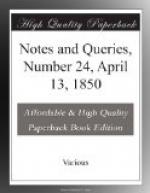Dr. Whichcot and Lord Shaftesbury.—It is stated in Mr. Martyn’s Life of the First Lord Shaftesbury, that Dr. Whichcot was one of Shaftesbury’s most constant companions, and preached most of his sermons before him; and that the third Earl of Shaftesbury, the author of the Characteristics, is said to have published a volume of Whichcot’s sermons from a manuscript copy of the first Lord Shaftesbury’s wife. Can any of your readers give any further information as to the intimacy between Whichcot and Shaftesbury, of which no mention is made in any memoir of Whichcot that I have seen?
C.
Lines attributed to Henry Viscount Palmerston.—Permit me to inquire whether there is any better authority than the common conjecture that the beautiful verses, commencing,—
“Whoe’er, like me, with trembling
anguish brings
His heart’s whole treasure to fair
Bristol’s springs,”
were written by Henry Viscount Palmerston, on the death of his lady at the Hot-wells, June 1 or 2, 1769. They first appeared p. 240. of the 47th vol. of the Gentleman’s Magazine, 1777.
They also have been attributed to Dr. Hawkeworth, but his wife survived him. There is a mural tablet under the west window of Romsey Church, containing some lines to the memory of Lady Palmerston, but they are not the same. Perhaps some of your correspondents are competent to discover the truth.
INDAGATOR.
Gray’s Alcaic Ode.—Can any of your readers say whether Gray’s celebrated Latin ode is actually to be found entered at the Grande Chartreuse? A friend of mine informs me that he could not find it there on searching.
C.B.
Abbey of St. Wandrille.—Will “GASTROS” kindly allow me to ask him a question? Does the Chronicle of the Abbey of St. Wandrille, which he mentions (No. 21. p. 338.), include notices of any of the branches of that establishment which settled in England about the time of the Conquest; and one of which, the subject of my query, formed a colony at Ecclesfield, near Sheffield?
I feel an interest in this little colony, because my early predecessors in this vicarage were elected from its monks. Moreover, some remains of their convent, now incorporated into what is called “the hall,” and forming an abutment which overlooks my garden, are affording an appropriate domicile to the curate of the parish.
ALFRED GATTY.
Ecclesfield, March 26. 1850.
Queries as to “Lines on London Dissenting Ministers” of a former Day.—Not having made Notes of the verses so entitled, I beg to submit the following Queries:—
1. Does there exist any printed or manuscript copy of lines of the above description, in the course of which Pope’s “Modest Foster” is thus introduced and apostrophised:—
“But see the accomplish’d
orator appear,
Refined in judgment, and in language clear:
Thou only, Foster, hast the pleasing art
At once to charm the ear and mend the
heart!”




